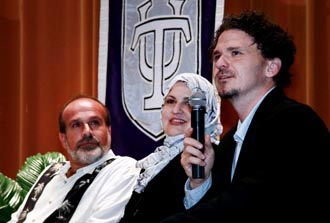Author Dave Eggers Tells Tales From the Flood
“Why are you here?” Dave Eggers posed this question to an exuberant audience of mainly first-year students in McAlister Auditorium on Thursday (Aug. 26).

Author Dave Eggers, right, discusses his Reading Project book, flanked by husband and wife Abdulrahman and Kathy Zeitoun. (Photo by Guillermo Cabrera-Rojo)
Eggers, author of Zeitoun, this year's Reading Project book, offered an answer to his own question by saying that presumably Tulane students have come to the university to find their purpose in life. And, tongue-in-cheek, he told them they had four years to do it. Everyone is looking for a sense of purpose, said Eggers, and some of us are fortunate to find that purpose, if only for a moment in time.
Abdulrahman Zeitoun, subject of the eponymously titled book, is someone who “had an absolute sureness about why he was here,” in the days after Hurricane Katrina, said Eggers.
Zeitoun, a painting contractor and house renovator, and his wife, Kathy, appeared on stage with Eggers.
When the levees broke and the city flooded, Zeitoun pulled a canoe out from his backyard in the Broadmoor neighborhood and paddled through the eerily quiet city, rescuing people and caring for pets left behind by others. “I would feel lucky to help someone,” Zeitoun told Eggers.
Zeitoun's sense of duty and responsibility and his personal heroism in the most trying of circumstances drew in Eggers. And then there was the intersection between Zeitoun's Katrina disaster experience and the war on terror.
In the chaotic days after the storm, some law enforcement personnel acted as if they were in a war zone in New Orleans. Zeitoun was falsely accused of looting, unfairly jailed and harshly treated, especially when his guards learned he was a Muslim.
Eventually, Zeitoun was released and exonerated. He's continued with his contracting work, rebuilding 160 homes in New Orleans since the storm.
If there is a lesson to be learned from Zeitoun's story, said Eggers, it is that ”to maintain a system of justice the quite good one we have it takes constant vigilance. It takes an ability to interrogate the truth whenever possible. When we make assumptions about guilt or innocence based on somebody's appearance or faith and both of those things happened to Zeitoun we become small-minded and small-hearted.”
